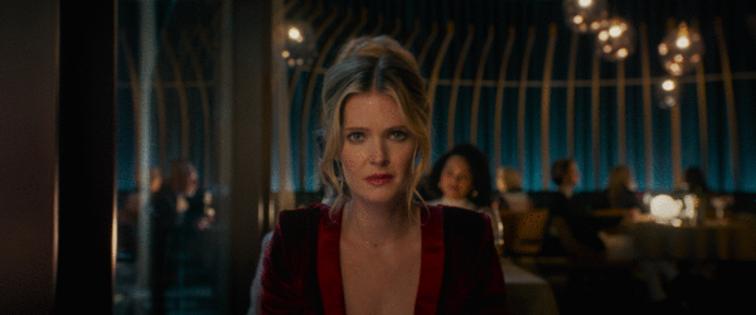'Drop' review: We'll start with the death threats, and two glasses of the Malbec
Published in Entertainment News
A film that does the doomscrolling for you, “Drop” relies on a great deal of nervous, life-and-death messaging. You may end up watching it with your own cellphone in hand, thumb-typing like mad, like Pavlov’s texter. Director Christopher Landon does everything under the sun to vary the visual depiction of these messages. As digitally dropped threats from an unknown predator grow increasingly sinister during the protagonist’s big date at a swank Chicago restaurant, the messages blast across the big screen in huge letters, or plaster an entire wall of the ladies’ restroom.
“Drop” has no interest in keeping the digital mundanities of the real world outside the theater. At the same time, it’s willfully nutty as a narrative construction; it’s a hundred-minute holiday from plausibility. And within their rickety framework, screenwriters Jillian Jacobs and Chris Roach create an emotionally investable leading character, fleshed out artfully by Meghann Fahy (Emmy winner for Season 2 of “The White Lotus”). This woman goes through hell to learn why someone’s demanding that she kill her dinner companion, the empathetic, highly dateable photographer employed by the Chicago Mayor’s Office, played by Brandon Sklenar of “It Ends With Us” and “1923.”
Much of “Drop” takes place in the restaurant, with nighttime views of some other city’s attempt at an interesting skyline. (Dublin’s, in fact; “Drop” was filmed in Ireland on a roughly $10 million production budget.) In a brutal prologue, we witness Violet, played by Fahy, beaten nearly to death by her vicious husband, and for the last time. The movie returns to this flashback at strategic points.
In the present-day setting, Violet is a therapist seen counseling a fellow abuse survivor and is now a widow with a young son, Toby (Jacob Robinson). After some online interactions with photographer Henry (Sklenar), Violet agrees to meet this man in person, while her sister (Violett Beane) takes care of Toby at home. Entering the restaurant, whose signage helpfully includes the words “fine dining restaurant,” she’s greeted by prying, possibly dangerous glances from every male and most of the females present.
The AirDrop-type messages (here called “Digi-Drop”) ping Violet’s cellphone, relentlessly. The sender can see and hear Violet’s every move, which means anyone in the restaurant might be the one threatening to have her son and sister killed if she doesn’t poison Henry for reasons to be named later. Who’s doing this? The beady-eyed weasel at the bar, claiming to be waiting for his sister? The friendly bartender? The awkward diner waiting for his own dinner companion? The sleazy cocktail lounge piano player?
From there, “Drop” cross-cuts between the restaurant and the escalating soon-to-be-murder scene at Violet’s house, with an deadly intruder on the premises. The script bungles a key element: At the climax, all we need is a quick dose of boring but lucid exposition regarding the antagonist’s motives, so we can check it off the list and get to the absurd burst of “Die Hard” action stuff. “Drop” complies, but with the murkiest, most half-hearted three seconds any two screenwriters could possibly write. Most movies go nuts with exposition, because most scripts in development these days get studio or producer notes requiring pointless reiterations of plot points. The assumption today is that viewers will be texting while allegedly watching the movie. In a strange irony, “Drop” — a movie entirely concerned with digital multitasking — blows the one bit it needed to make clear.
In its fashion, “Drop” belongs to a tradition of tiny-acreage thrillers, among them the plane-bound “Red Eye” (2005); “Phone Booth” (2002); and, in a more verbose vein, the car-interior thriller “Locke” (2013) and the boardroom setting of “Margin Call” (2011). The film may be a silly thing, with manic swings from intimate (and pretty rough) violence to abrupt comic relief. But Fahy and Sklenar provide the glue. And for every supporting player overplaying his hand — chiefly, Jeffery Self as the motormouth waiter who brags (this detail’s funny) about his improv training courtesy of Second City — there’s a well-judged turn elsewhere. MVP? Gabrielle Ryan, a genuine star in the making as the bartender on duty. In an ensemble of potential killers, in what’s supposed to be a really, really classy joint, Ryan’s the ringer who makes it seem like one.
———
'DROP'
2.5 stars (out of 4)
MPA rating: PG-13 (for strong violent content, suicide, some strong language and sexual references)
Running time: 1:40
How to watch: Now in theaters
———
©2025 Chicago Tribune. Visit chicagotribune.com. Distributed by Tribune Content Agency, LLC.













Comments